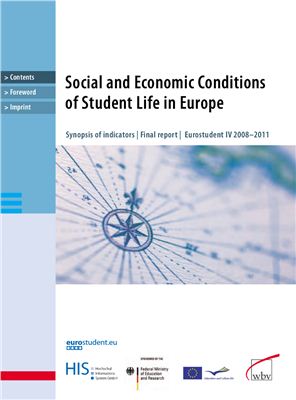W. Bertelsmann Verlag, GmbH & Co. KG, Bielefeld 2011 - 227p.
This publication of the results of EUROSTUDENT IV represents an important contribution to com-parative research on European higher education. The study, the 4 th in a series, provides a comprehensive Synopsis of Indicators on the social and economic conditions of student life from 24 countries. The EUROSTUDENT research programme has evolved from modesbeginnings; only 8 coun-tries were included in the first study published in 2000; 11 countries were included in the 2005 study while the 2008 publication involved 23 countries. The increased scope in coverage has been matched by a corresponding development in methodologi-cal sophistication.
It is a compliment to the initiators of this research programme that their acuity and strategic thinking has been recognised by key decision makers who have been entrusted with developing the European Higher Education Area. Both the European Union (Council of the European Union, 2010) and the Ministers Responsible for Higher Education in the 47 countries involved in the Bologna Process (Leu-ven/Louvain-la-Neuve Communiqu?, 2009) have come to emphasise increasingly the importance of the ‘social dimension’ of higher education policy.
Both have recognised that a precondition for mak-ing progress on this dimension is the availability of relevant and reliable data on social conditions of student life and on mobility. The findings from the EUROSTUDENT Surveys have come to form an important element in the creation of this data base, which is used for policy development and evalua-tion. Thus, what started out as a modest compara-tive research project has acquired a strategic impor-tance in European higher education policy making.
This publication of the results of EUROSTUDENT IV represents an important contribution to com-parative research on European higher education. The study, the 4 th in a series, provides a comprehensive Synopsis of Indicators on the social and economic conditions of student life from 24 countries. The EUROSTUDENT research programme has evolved from modesbeginnings; only 8 coun-tries were included in the first study published in 2000; 11 countries were included in the 2005 study while the 2008 publication involved 23 countries. The increased scope in coverage has been matched by a corresponding development in methodologi-cal sophistication.
It is a compliment to the initiators of this research programme that their acuity and strategic thinking has been recognised by key decision makers who have been entrusted with developing the European Higher Education Area. Both the European Union (Council of the European Union, 2010) and the Ministers Responsible for Higher Education in the 47 countries involved in the Bologna Process (Leu-ven/Louvain-la-Neuve Communiqu?, 2009) have come to emphasise increasingly the importance of the ‘social dimension’ of higher education policy.
Both have recognised that a precondition for mak-ing progress on this dimension is the availability of relevant and reliable data on social conditions of student life and on mobility. The findings from the EUROSTUDENT Surveys have come to form an important element in the creation of this data base, which is used for policy development and evalua-tion. Thus, what started out as a modest compara-tive research project has acquired a strategic impor-tance in European higher education policy making.

